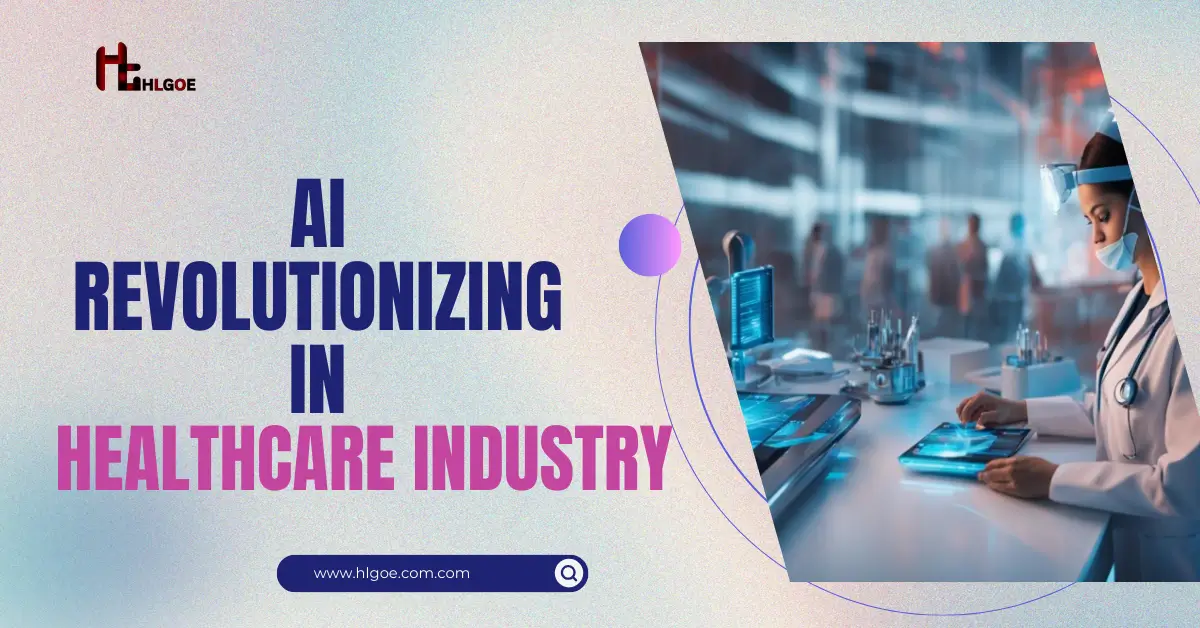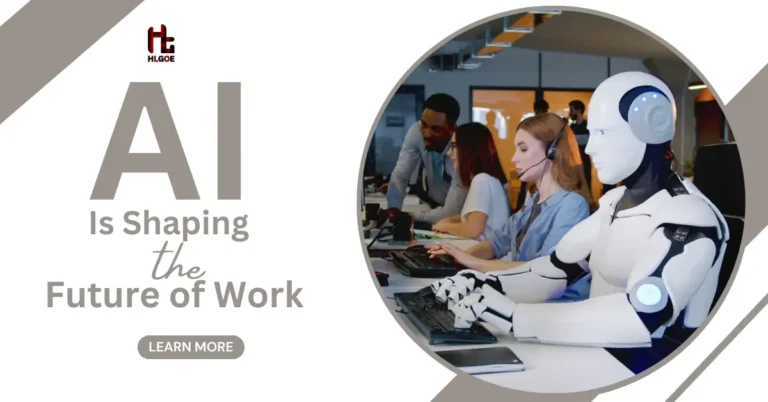How AI Is Revolutionizing the Healthcare Industry
The healthcare industry is facing unprecedented challenges. The rising global demand for healthcare services, an aging population, healthcare worker shortages, and increasing operational costs have placed immense pressure on healthcare systems worldwide. According to a report by the World Health Organization, the global population aged 60 years and older is expected to more than double, from 1 billion in 2020 to 2.1 billion by 2050. As a result, the demand for healthcare services will continue to escalate, outpacing the capacity of traditional healthcare systems.
In the U.S. alone, healthcare spending accounts for nearly 18% of the GDP, a staggering figure that continues to rise year over year. Despite these significant investments, however, challenges such as delayed diagnoses, inefficient treatments, and rising patient care costs persist. These inefficiencies, combined with the overwhelming volume of medical data, leave healthcare professionals struggling to provide optimal care in a timely and cost-effective manner.
Artificial Intelligence (AI) has emerged as a promising solution to these pressing issues. AI technologies, such as machine learning and predictive analytics, have the potential to revolutionize the healthcare industry by enabling faster, more accurate diagnostics, personalized treatment plans, and more efficient management of patient care. By leveraging vast datasets and cutting-edge algorithms, AI in healthcare can help mitigate the challenges that healthcare systems face today, creating opportunities for better patient outcomes and lower operational costs.
AI in Healthcare: A Game-Changer
AI in healthcare is much more than just a technological trend—it’s a game-changer. AI healthcare applications encompass a broad range of technologies that help healthcare professionals improve patient care, streamline operations, and make more informed decisions. At its core, AI in healthcare is about making sense of large volumes of patient data to deliver insights that are both timely and actionable.
One of the major areas where AI is making strides is in diagnostics. AI-powered systems can analyze medical images, genetic data, and patient histories faster and more accurately than traditional methods. In fact, studies have shown that AI models are already outperforming human doctors in diagnosing conditions like lung cancer and breast cancer from medical imaging. For example, a 2020 study published in Nature Medicine found that an AI model developed by Google Health achieved greater accuracy in diagnosing breast cancer compared to radiologists, with a 5% improvement in false-positive rates.
These innovations are already being implemented in hospitals and healthcare settings across the globe, enhancing the capabilities of healthcare providers and improving patient care.
Revolutionizing Diagnostics with AI
One of the most significant contributions of AI to healthcare is its role in revolutionizing diagnostics. Traditional diagnostic methods often rely on the subjective judgment of healthcare providers, which can lead to misdiagnoses or delayed detection. However, AI in healthcare is changing the landscape by providing objective, data-driven insights that are more accurate and reliable.
For example, AI-powered diagnostic tools in medical imaging are able to spot anomalies in X-rays, MRIs, and CT scans that may not be immediately apparent to human clinicians. Research from the Journal of the American Medical Association (JAMA) demonstrated that an AI model developed by Stanford University was able to accurately detect pneumonia from chest X-rays with an accuracy rate of 92%, outperforming radiologists in some cases.
Furthermore, AI healthcare applications are also being used to detect conditions such as diabetic retinopathy, cardiovascular disease, and even early signs of Alzheimer’s. In fact, AI can identify at-risk patients much earlier than traditional methods, allowing for earlier intervention and improving patient outcomes.
Enhancing Treatment Plans through AI
Once a diagnosis is made, the next step is crafting a personalized treatment plan. Historically, treatment plans have been based on general guidelines and a healthcare provider’s judgment. However, AI in healthcare is now enabling more tailored, data-driven treatment strategies that take into account a patient’s unique genetic makeup, lifestyle factors, and medical history.
AI systems can analyze massive amounts of medical data, including genetic information, to recommend the most effective treatment options. For instance, AI algorithms are being used to personalize cancer treatments based on the genetic profile of a patient’s tumor. Studies show that AI-powered precision medicine has resulted in significant improvements in cancer treatment outcomes, particularly in targeting specific mutations.
Moreover, AI can help predict how patients will respond to different treatments, minimizing the trial-and-error approach that is often seen with new therapies. This leads to fewer side effects, better efficacy, and ultimately, higher patient satisfaction.
Predictive Analytics: Improving Patient Outcomes
AI’s ability to predict health outcomes is another key benefit to the healthcare system. Predictive analytics powered by machine learning models can analyze data trends to forecast potential health risks before they happen, enabling proactive intervention.
For example, AI tools can predict the risk of a patient experiencing a heart attack or stroke by analyzing data such as blood pressure, cholesterol levels, and family history. According to a study published by The Lancet, AI-based models used in cardiac care were able to predict patient risk with greater accuracy than traditional scoring methods, such as the Framingham risk score.
Predictive models also help hospitals anticipate patient volumes, reducing the strain on healthcare facilities during peak times. By forecasting demand and optimizing staffing levels, AI in healthcare helps ensure resources are allocated efficiently, which is critical in minimizing wait times and improving patient care delivery.
AI in Drug Discovery and Development
The drug discovery process is one of the most time-consuming and expensive aspects of healthcare research. On average, it takes over 10 years and costs more than $2.6 billion to bring a new drug to market. However, medical AI is speeding up this process by enabling researchers to analyze vast datasets of chemical compounds, patient records, and scientific research much more efficiently.
AI algorithms can predict which drug compounds are most likely to succeed in clinical trials, thus narrowing the field of potential candidates and saving time and money. A study from MIT demonstrated that AI can reduce the time required for drug discovery by as much as 70%, accelerating the development of life-saving treatments.
Moreover, AI is improving the clinical trial process by identifying suitable participants, predicting how individuals will respond to treatments, and minimizing costly trial failures. This helps pharmaceutical companies bring new drugs to market more quickly and at a lower cost.
Advantages of AI in Healthcare
The impact of AI on healthcare is largely positive, with numerous advantages for both patients and providers. Here are some of the key benefits:
- Improved Diagnostics: AI models can analyze medical data with exceptional accuracy, enabling faster and more accurate diagnoses. This leads to earlier intervention and better outcomes. For example, AI’s ability to spot early signs of cancer, such as in breast cancer screenings, improves survival rates.
- Personalized Treatment: By analyzing patient-specific data, including genetic information, AI enables highly personalized treatment plans. This approach leads to more effective treatments with fewer side effects.
- Predictive Capabilities: AI’s ability to predict disease progression or health risks can lead to better prevention strategies. This can lower the burden on hospitals and reduce the frequency of emergency care.
- Operational Efficiency: AI streamlines administrative tasks, including scheduling and billing, which reduces overhead costs and allows healthcare professionals to focus more on patient care.
- Cost Reduction: AI’s ability to optimize operations, predict health risks, and assist in drug development has the potential to significantly reduce healthcare costs. According to Accenture, AI could save the U.S. healthcare system $150 billion annually by 2026.
Disadvantages of AI in Healthcare
While the benefits of AI are vast, there are also several challenges and risks associated with its implementation in healthcare:
- Data Privacy Concerns: The use of AI in healthcare requires access to vast amounts of sensitive patient data. Ensuring that this data is protected against breaches and misuse is crucial. A McKinsey survey showed that 73% of healthcare executives are concerned about data privacy when adopting AI solutions.
- Algorithmic Bias: AI systems are only as good as the data they are trained on. If the data is biased or incomplete, it could perpetuate existing healthcare disparities. For example, certain AI models have been found to disproportionately assign higher risk scores to Black patients compared to White patients.
- High Costs of Implementation: While AI has the potential to reduce costs in the long run, the initial implementation costs can be prohibitive for some healthcare systems. This includes costs related to technology infrastructure, training, and ongoing maintenance.
- Job Displacement: As AI systems take on more roles in healthcare, there are concerns that automation could replace certain jobs, particularly in administrative and diagnostic roles. However, many experts believe that AI will serve as a tool to augment human workers rather than replace them.
- Trust and Accountability: AI systems can sometimes make decisions that are not easily understandable to humans, leading to concerns about accountability. Healthcare providers need to trust AI’s recommendations, but a lack of transparency in decision-making processes can lead to hesitation in adopting AI tools.
The Future of AI in Healthcare
The potential for AI in healthcare to continue revolutionizing the industry is immense. As technology evolves, AI will play an even more critical role in areas such as robotic surgery, remote patient monitoring, and telemedicine. The integration of AI with wearable devices is also expected to dramatically improve health monitoring, enabling patients to receive real-time, personalized care.
Furthermore, medical AI will help drive down healthcare costs, particularly in low-resource settings. According to a report from Accenture, AI applications in healthcare could save the U.S. healthcare system up to $150 billion annually by 2026, through reductions in administrative costs, improved diagnostics, and streamlined operations.
Conclusion: The Power of AI in Shaping Healthcare’s Future
AI is transforming healthcare in profound ways, from improving diagnostics and treatment plans to enabling personalized medicine and predictive analytics. These advancements are not just theoretical—they’re already happening in healthcare settings around the world, delivering real-world benefits for patients and providers alike. However, challenges remain, particularly around data privacy, ethical concerns, and algorithmic bias. As AI technology continues to evolve, the future of healthcare looks increasingly data-driven, personalized, and efficient. AI healthcare applications are revolutionizing how we approach medicine, and the potential for further innovation is limitless.
By harnessing the power of medical AI, healthcare systems worldwide can not only address existing challenges but also create a more efficient, patient-centered model of care for the future.







